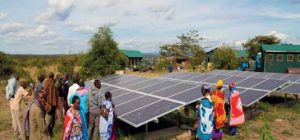(Akiit.com) Africa is a unique continent in so many ways, but perhaps one of the most exciting things that sets it apart is population density. Yes, Africa has a population of more than a billion people (expected to rise to nearly two billion by mid-century), but the people are sparsely distributed. You can travel for hundreds of miles through the African wilderness and find nothing but sporadic villages, dotting the landscape.
There’s a lack of centralization, and although people are migrating from rural areas to the towns, the process is happening more slowly than elsewhere. There’s just something structurally different here: less fertile land has meant that, historically, people are more spread out than in other parts of the world, like northern Europe or East Asia.
The sparse population is affecting how the continent gets its power. Independent power system installation is on the rise in the region, reflecting the difficulty in generating a centralized power system on the Western model. Africa needs to electrify if it is to improve standards of living, but it can’t do so on a western model. It has to find another way, owing to its unique geography and demography.
Solar In Africa
Solar power is, in many ways, the ideal solution for countries throughout Africa to meet their power needs. Not only does the continent have excellent solar resources, but solar can be installed on a micro scale, meaning that it’s suitable for how Africans live their lives. A solar panel can be set up just as quickly in a village in the hinterlands of Mozambique as it can in the center of a major city, like Nairobi.
The economics of solar are working in Africa’s favor too. On the largest of scales, the cost of solar is already below that of coal, an energy source which supplies most of the continent’s energy needs today. And soon, experts predict, it may be cheaper to install solar  power on a micro scale even than centralized coal power production.
power on a micro scale even than centralized coal power production.
The continent has more than 580 million people who already live off the grid. That’s more than in Latin America and Asia combined. By 2030, more than 80 percent of the world’s off-grid population are expected to live in Africa.
As Africa becomes wealthier over the coming decades, it’s very likely that we will see the emergence of new, energy-focused startups looking to cash in on local energy needs. Local businesses are more likely to understand the Africa energy market and create business models that allow people to buy or rent off-grid power solutions.
We’re a long way from universal implementation, but it could be the case that Africans could mostly skip over the centralized power production stage of development most other countries go through and get straight to cheap, renewable energy. After all, the continent already avoided landlines and went straight to mobile.
The World Bank suggests that in the coming decade, Africa could receive more than half of the world’s off-grid power venture capital – more than $922 million in total.
Staff Writer; Doug Ford








Leave a Reply